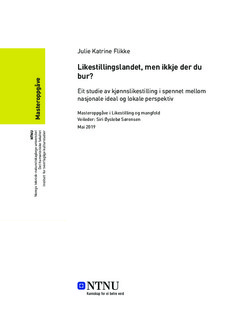| dc.contributor.advisor | Sørensen Øyslebø, Siri | |
| dc.contributor.author | Flikke, Julie Katrine | |
| dc.date.accessioned | 2019-09-06T14:00:09Z | |
| dc.date.available | 2019-09-06T14:00:09Z | |
| dc.date.issued | 2019 | |
| dc.identifier.uri | http://hdl.handle.net/11250/2613017 | |
| dc.description.abstract | I denne oppgåva studerer eg kjønnslikestilling, som er ein viktig norsk kulturell
verdi. At Norge er eit ‘likestillingsland’ er ein del av vår nasjonale identitet, men
samtidig finnast det store forskjellar i regional utøving av likestilling. Korleis kan
dette skje, når det same politiske nasjonale rammeverket gjeld for heile landet?
Problemstillinga mi handlar om å studere spennet mellom nasjonale og lokale
likestillingsforståingar, der eg gjer eit casestudie av Førde kommune i Sunnfjordregionen.
I oppgåva studerer eg likestillingsforståingar på tre ulike nivå: det nasjonale,
representert gjennom Statistisk sentralbyrå (SSB) og politiske dokument, lokal
likestillingspolitikk og offentleg opinion gjennom lokalmedia. Eg brukar ei
metode eg kallar samspelsanalyse. Igjennom denne bruker eg analysegreip
innanfor diskursanalyse for å studere samspelet mellom dei ulike diskursive
likestillingsforståingane på områda deltidsarbeid, fordeling av foreldrepermisjon
og kjønnsfordelt leiing. Måten eg gjer dette på er å fyrst studere kva diskursar som
er i spel med kvarandre på kvart nivå, før eg ser på intertekstuelle samanhengar
mellom dei i samspelsanalysen.
Analysen viser at dei to dominerande likestillingsforståingane handlar om to
grunnleggande ulike måtar å sjå likestilling på: anten om noko som handlar om
valfridom, eller om skeive samfunnsstrukturar. Desse knyt eg til den historiske
likestillingsdebatten i Norge. Desse forståingane går igjen båe på det nasjonale og
det lokale nivået. Det som er interessant, er at eg tydeleg ser at det nasjonale
rammeverket har påverka den lokale likestillingsforståinga. Men dette har ikkje
gått i ei rett linje nedover. Lokal politikk og opinion oppfattar signal rundt
viktigheita av likestilling frå det nasjonale, men tolkar det på si eiga måte og
utformar sine eigne forståingar basert på eigne interesser og lokal kontekst.
Kommunen har eit klart perspektiv som arbeidsgjevar som vil skape verdiar, og
lokale familiar er særleg opptatte av deira posisjon og fleksibilitet innanfor det
nasjonale likestillingsrammeverket. Slike funn viser at det er viktig at fleire
utforskar samspelet mellom nasjonale og lokale perspektiv. | |
| dc.description.abstract | In this thesis I explore the important Norwegian cultural value of gender equality.
Being a nation of gender equality is part of our national identity, and yet, there are
large regional differences within our borders. How is this possible, when the same
national political framework applies to the entire country? My thesis question
concerns the study of the interplay between national and local understandings of
equality, by doing a case study of the town Førde, located in the Sunnfjord-region.
In the analysis, I explore understandings of gender equality on three different
levels: the national, represented by Statistics Norway and political documents,
local policy documents, and public opinion represented by local media. To do this
I use a method I choose to call ‘interactional analysis’. I employ methods within
discourse analysis in order to study the interplay between different discursive
understandings of equality in the areas of part-time work, the dividing of parental
leave, and gender in leadership. I begin by studying which discourses are at play
at each different level, before I explore intertextual links between them as they
compete and interact with each other.
My analysis shows that the two dominant ways of understanding equality are
linked to two basic ways of looking at equality: is it about freedom of choice, or
imbalance in societal structures? I link these two to the historical debate
surrounding equality in Norway and find that they are still at play both at the
national and the local level. What is interesting, is that the national framework
clearly has affected local understandings of equality. But this has not gone in a
straightforward manner. Local politics and public opinion have received certain
signals from the national level about the importance of equality, but they interpret
this in their own way and form new basis of understanding based on their own
interests and local context. The municipality have a clear perspective as a large
local employer who wants to create growth, and local families are particularly
interested in the own positions and flexibility within the national framework of
equality policies. Findings such as these showcase the importance of more
scholars to turn their attention to the interaction between the national and local
levels of understanding. | |
| dc.language | nno | |
| dc.publisher | NTNU | |
| dc.title | Likestillingslandet, men ikkje der du bur? Eit studie av kjønnslikestilling i spennet mellom nasjonale ideal og lokale perspektiv | |
| dc.type | Master thesis | |
